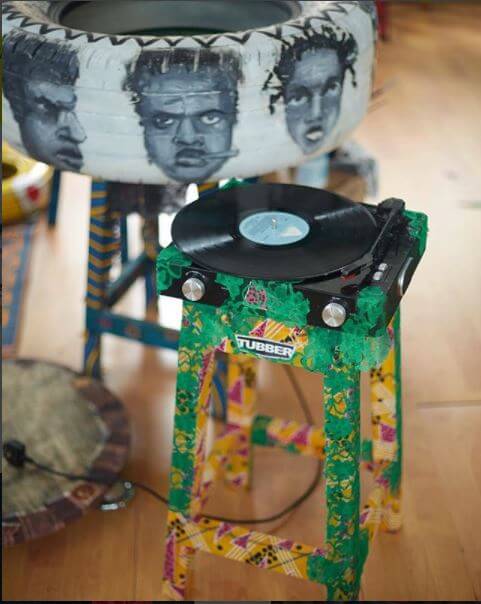Your legs are tired and shaky from walking under the afternoon heat. All you want to do is crash into a sofa, chair, bench, whatever. You walk into a lounge and move towards the closest seat. You start to lower yourself to the seat, you pause. Right there, under your hovering buttocks, behind your aching legs, is an artist’s canvas. You forget all about your pains and start to inspect, lost in colours, patterns and the artistic lures of this chair, this artwork, this canvas.
That is what Charles Alexander Oputa Jr.’s art works do to you. Yes, he is the legendary Charlie boy’s son, so perhaps that explains a thing or two?
Most of his works are signature tyre and ankara furniture pieces, creatively put together to appeal to our finer sensibilities, yet they serve their utilitarian purposes just fine so that after you finally remember your aching legs, you can sit peacefully to enjoy a drink.
One begins to wonder how the artist attained this level of artistic genius. Did Charles A. Oputa Jr choose his art or did it choose him? We asked him and he had this to say:
“I think art has always chosen me, my dad was an artist, Charlie Boy. I used to watch his shows- All the artists that would come to get knowledge or try to pick his brain. My mom was always into fashion. She made all his costumes…. I think she brought the visual art to his music side of the career.
…when I was a kid, I always wanted stuff like games. So, in order to buy those extra things that I wanted. I used to make figures out of wires. I would put the wire on a comic book and trace the characters out and then I would stick it to a board or a small base and I would sell it. Someone kicking a football or someone holding something on their head, and people buy it from me. It started at a young age, so yeah, art has always chosen me.”
The level of creativity we see in Tubber Art prompted us to ask him, “What inspires your creativity?” His answer gave us insight into the frustrations an artist faces when they lack resources to create their works.
“I think my creativity is based on materials. What I can find around me. Art is very expensive. On the business side of it. Thank God I went to school for business. You see broke artists everywhere and wonder ‘if you can create stuff like this, why are you broke?’ It is because you always want to create. Every day you want to build something. Everyday there is a new idea. It is a very expensive endeavor. If you are going into art, mehn, I hope you have money? When you don’t have things, it affects your art. It is emotionally draining, physically draining and puts you in a bad mood. Then you start to feel like you are not doing anything with your life. You never wanna run out of things. You always wanna have things. Raw materials were the first thing that got me into the art that I’m doing right now. Colours, African fabrics, things like that.”
Coming into the business, or coming into art because I feel art is a different type of business entirely, it is a business that you have to know yourself personally – you have to know yourself in order to relate to people that would appreciate you. Because if you are doing art, you need appreciation and the only appreciation now, everybody has made it simple- the appreciation is money. (He laughs) The best appreciation you can give is money. Well, I won’t say the best. I would say more of the global appreciation value is money…”
A lot of artists complain that art doesn’t pay the bills. Tubber Art appears to be doing well so we asked Mr. Oputa’s opinion and advice for artists who are struggling to pay their bills.
“…An artist is like an extension. It is like something you are born with – yeah, it has to be something you are born with. You can’t just pluck it out of the sky or go to school and learn it. Yes, you can learn the basics but it’s sticking with it that is the thing.
…In order to find if it’s something in you, you have to keep on doing it. And each time you are doing it, ask yourself. Is this me? Until you stop asking yourself. Until you have no food in your house and you have one thousand naira- and it is left for you to buy food for your stomach or work for your art and you just decide to buy work for your art. Then you know that you have landed. Because, in order to gain, you must lose. Then from losing, you start making good decisions.
… So I would say, it pays the bills but you just have to know who you are, you have to know what you are doing, in order for you to find somebody comfortable enough to start paying your bills…it is like saying somebody else should come and pay your way through life. No, you have to do something to that person. You have to give that person some kind of feel.
So, back to the question, art does pay the bill. The advice I can give to you is to know what you are doing, as my father told me- always try to be the best. Don’t sleep on it. Don’t say because I’m selling good in this area… no, try and see how you can grow in other areas. Stick in the safe zone, because the business side of it is, when you make a mistake you pay for it. So if you keep on paying for mistakes, you keep on going back. Each mistake is a backward movement…you are trying not make as much mistakes. Stick to a safe zone but make stronger moves, so if you keep on making stronger moves, you climb harder.”
Creative folks generally do not like to play by the rules. They know the rules and deliberately break them. However, even in this non-conformity, there is a convention. Charles A. Oputa’s Tubber disrupts by combining utility with visual appeal in furniture pieces and we clearly see that it is going places.
You can listen to the full version of Charles Oputa jr.’s interview answers below.



